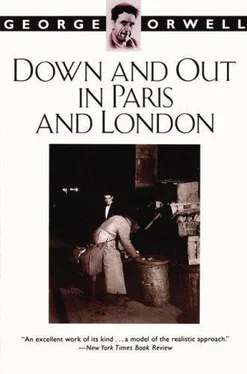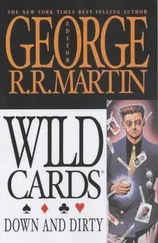George Orwell - Down and Out in Paris and London
Здесь есть возможность читать онлайн «George Orwell - Down and Out in Paris and London» весь текст электронной книги совершенно бесплатно (целиком полную версию без сокращений). В некоторых случаях можно слушать аудио, скачать через торрент в формате fb2 и присутствует краткое содержание. Жанр: Старинная литература, на русском языке. Описание произведения, (предисловие) а так же отзывы посетителей доступны на портале библиотеки ЛибКат.
- Название:Down and Out in Paris and London
- Автор:
- Жанр:
- Год:неизвестен
- ISBN:нет данных
- Рейтинг книги:5 / 5. Голосов: 1
-
Избранное:Добавить в избранное
- Отзывы:
-
Ваша оценка:
- 100
- 1
- 2
- 3
- 4
- 5
Down and Out in Paris and London: краткое содержание, описание и аннотация
Предлагаем к чтению аннотацию, описание, краткое содержание или предисловие (зависит от того, что написал сам автор книги «Down and Out in Paris and London»). Если вы не нашли необходимую информацию о книге — напишите в комментариях, мы постараемся отыскать её.
Down and Out in Paris and London — читать онлайн бесплатно полную книгу (весь текст) целиком
Ниже представлен текст книги, разбитый по страницам. Система сохранения места последней прочитанной страницы, позволяет с удобством читать онлайн бесплатно книгу «Down and Out in Paris and London», без необходимости каждый раз заново искать на чём Вы остановились. Поставьте закладку, и сможете в любой момент перейти на страницу, на которой закончили чтение.
Интервал:
Закладка:
slices and buying half an ounce of tobacco, I had a
halfpenny left. I did not care to ask B. for more money
yet, so there was nothing for it but to go to a casual
ward. I had very little idea how to set about this, but I
knew that there was a casual ward at Romton, so I
walked out there, arriving at three or four in the after-
noon. Leaning against the pigpens in Romton market-
place was a wizened old Irishman, obviously a tramp. I
went and leaned beside him, and presently offered him
my tobacco-box. He opened the box and looked at the
tobacco in astonishment:
"By God," he said, "dere's sixpennorth o' good baccy
here! Where de hell d'you get hold o' dat? You ain't
been on de road long."
"What, don't you have tobacco on the road?" I said.
"Oh, we
has it. Look."
He produced a rusty tin which had once held Oxo
Cubes. In it were twenty or thirty cigarette ends, picked
up from the pavement. The Irishman said that he rarely
got any other tobacco; he added that, with care, one
could collect two ounces of tobacco a day on the
London pavements.
"D'you come out o' one o' de London spikes [casual
wards], eh?" he asked me.
I said yes, thinking this would make him accept me as a
fellow tramp, and asked him what the spike at Romton
was like. He said:
"Well, 'tis a cocoa spike. Dere's tay spikes, and cocoa
spikes, and skilly spikes. Dey don't give you skilly in
Romton, t'ank God-leastways, dey didn't de last time I
was here. I been up to York and round Wales since."
"What is skilly?" I said.
"Skilly? A can o' hot water wid some bloody oatmeal
at de bottom; dat's skilly. De skilly spikes is always de
worst."
We stayed talking for an hour or two. The Irishman was a
friendly old man, but he smelt very unpleasant, which was
not surprising when one learned how many diseases he
suffered from. It appeared (he described his symptoms
fully) that taking him from top to bottom he had the
following things wrong with him: on his crown, which
was bald, he had eczema; he was shortsighted, and had no
glasses; he had chronic bronchitis; he had some
undiagnosed pain in the back; he had dyspepsia; he had
urethritis; he had varicose veins, bunions and flat feet.
With this assemblage of diseases he had tramped the
roads for fifteen years.
At about five the Irishmen said, "Could you do wid e
cup o' tay? De spike don't open till six."
"I should think I could."
"Well, dere's a place here where dey gives you a free
cup o' tay and a bun.
Good tay it is. Dey makes you say
a lot o' bloody prayers after; but hell! It all passes de
time away. You come wid me."
He led the way to a small tin-roofed shed in a side-
street, rather like a village cricket pavilion. About
twenty-five other tramps were waiting. A few of them
were dirty old habitual vagabonds, the majority decent-
looking lads from the north, probably miners or cotton
operatives out of work. Presently the door opened and a
lady in a blue silk dress, wearing gold spectacles end a
crucifix, welcomed us in. Inside were thirty or forty hard
chairs, a harmonium, and a very gory lithograph of the
Crucifixion.
Uncomfortably we took off our caps end sat down. The
lady handed out the tea, and while we ate and drank she
moved to and fro, talking benignly. She talked upon
religious subjects-about Jesus Christ always having e
soft spot for poor rough men like us, and about how
quickly the time passed when you were in church, and
what a difference it made to a man on the road if he said
his prayers regularly. We hated it. We sat against the
well fingering our caps (a tramp feels indecently exposed
with his cap off), and turning pink and trying to mumble
something when the lady addressed us. There was no
doubt that she meant it all kindly. As she came up to one
of the north country lads with the plate of buns, she said
to him:
"And you, my boy, how long is it since you knelt down
and spoke with your Father in Heaven?"
Poor lad, not a word could he utter; but his belly
answered for him, with a disgraceful rumbling which
it set up at sight of the food. Thereafter he was so
overcome with shame that he could scarcely swallow his
bun. Only one men managed to answer the lady in her
own style, end he was a spry, red-nosed fellow looking
like a corporal who had lost his stripe for drunkenness.
He could pronounce the words "the dear Lord Jesus"
with less shame then anyone I ever saw. No doubt he had
learned the knack in prison.
Tea ended, and I saw the tramps looking furtively at
one another. An unspoken thought was running from
man to man-could we possibly make off before the
prayers started? Someone stirred in his chair-not getting
up actually, but with just a glance at the door, as though
half suggesting the idea of departure. The lady quelled
him with one look. She said in a more benign tone than
ever:
"I don't think you need go
quite yet. The casual ward
doesn't open till six, and we have time to kneel down and
say a few words to our Father first. I think we should all
feel better after that, shouldn't we?"
The red-nosed man was very helpful, pulling the
harmonium into place and handing out the prayerbooks.
His back was to the lady as he did this, and it was his
idea of a joke to deal the books like a pack of cards,
whispering to each men as he did so, "There y'are, mate,
there's a--- nap 'end for yer! Four aces and a king!" etc.
Bareheaded, we knelt down among the dirty teacups
and began to mumble that we had left undone those
things that we ought to have done, and done those things
that we ought not to have done, and there was no health
in us. The lady prayed very fervently, but her eyes roved
over us all the time, making sure that we were attending.
When she was not looking we grinned and winked at one
another, and whispered bawdy jokes, just to show that we did
not care; but it stuck in our throats a little. No one except
the rednosed man was self-possessed enough to speak the
responses above a whisper. We got on better with the singing,
except that one old tramp knew no tune but "Onward,
Christian soldiers," and reverted to it sometimes,
spoiling the harmony.
The prayers lasted half an hour, and then, after a
handshake at the door, we made off. "Well," said
somebody as soon as we were out of hearing, "the
trouble's over. I thought them ----prayers was never goin'
to end."
"You 'ad your bun," said another; "you got to pay for
it."
"Pray for it, you mean. Ah, you don't get much for
nothing. They can't even give you a twopenny cup of tea
without you go down on you -----knees for it."
There were murmurs of agreement. Evidently the
tramps were not grateful for their tea. And yet it was
excellent tea, as different from coffee-shop tea as good
Bordeaux is from the muck called colonial claret, and we
were all glad of it. I am sure too that it was given in a
good spirit, without any intention of humiliating us; so in
fairness we ought to have been grateful-still, we were
not.
XXVII
AT about a quarter to six the Irishman led me to the spike.
It was a grim, smoky yellow cube of brick, standing in a
corner of the workhouse grounds. With its rows of tiny,
barred windows, and a high wall and iron gates separating
Читать дальшеИнтервал:
Закладка:
Похожие книги на «Down and Out in Paris and London»
Представляем Вашему вниманию похожие книги на «Down and Out in Paris and London» списком для выбора. Мы отобрали схожую по названию и смыслу литературу в надежде предоставить читателям больше вариантов отыскать новые, интересные, ещё непрочитанные произведения.
Обсуждение, отзывы о книге «Down and Out in Paris and London» и просто собственные мнения читателей. Оставьте ваши комментарии, напишите, что Вы думаете о произведении, его смысле или главных героях. Укажите что конкретно понравилось, а что нет, и почему Вы так считаете.












